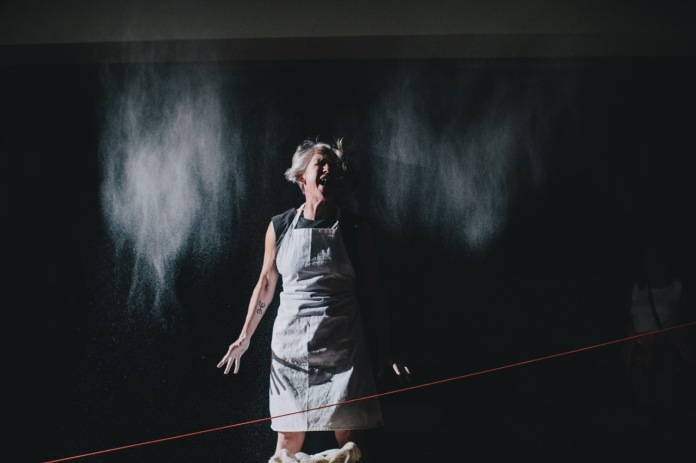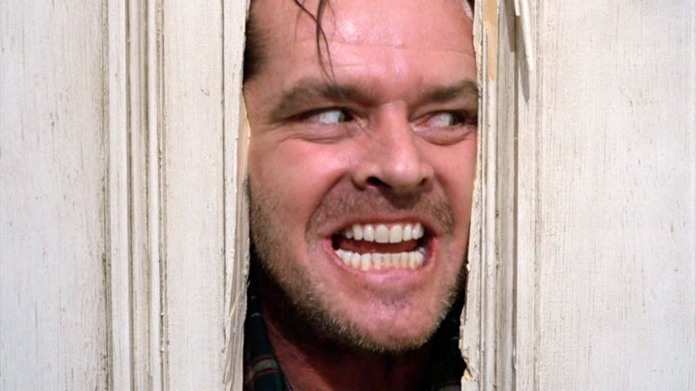Part 2: Conversation with Chi Vu
Chi is a Vietnamese-born writer and director. Chi and I did our Masters together at the VCA and I really appreciated this opportunity to talk to her about the use of violence in her work.
Chi starts our conversation by telling me that she doesn’t actually enjoy watching horror.
Chi: I think I’m only willing to put myself through the process of watching horror movies, to get my emotions messed with, if there’s a purpose to it. If I feel like the director and the screenwriters have a point they’re trying to make through the violence. If it’s just gratuitous violence then I get really angry. I try to avoid seeing those kinds of movies by asking around before hand: have you seen this movie? Is there a point to the violence? I do that to make sure that what I put myself through is for a reason, rather than simply feeling disturbed about it, but then not getting anything more out of it. I guess in some ways it’s like people who go through an ordeal. You would go through that, take that big risk, if you thought it was worth it for some reason. So I think movies are like that.
I ask Chi about her approach to horror and violence in her play, The Dead Twin.
Chi: Director Deborah Leiser-Moore and I are exploring the trauma of war, and how when the older generations have gone through trauma, it’s actually quite violent to ask them, ‘Hey what happened, can you tell me?’ Because they often don’t want to re-live that, which they would have to do in order to tell you. But the younger generation wants to know: what was it like during the war and why are we here? That search for the truth can be a real act of violence against the older generation, even though it’s not done with malice. So sometimes there is just silence around the whole topic. Sometimes the older generation thinks that this is better for the the younger generation – because it will set them free of the horrors of the past. But it doesn’t work that way, because the children are haunted, regardless. Marianne Hirsch studied the children of Holocaust survivors. She came up with the idea of postmemory: that the second generation ‘inherited’ memories that the older generation experienced which are so vivid it’s almost like your memories. So you are haunted by that trauma. Deborah’s other performance works also look at war trauma, especially those of ex-soldiers from around the world. I’m really excited to be working with her on this piece.
But also, the secret story to The Dead Twin – and I don’t mind if people don’t interpret it like this at all – is about repressed identity, whether it’s cultural or linguistic, or some other repressed identity. I feel like the Vietnamese side of me is like a twin that some people with a mono-cultural or monolingual mindset don’t want to acknowledge as a really important part of me. And they could be Vietnamese or Anglo-Australian. For example, you might get some first-generation Vietnamese person who’s conservative who thinks you should be writing in Vietnamese or else it’s not valid. And it’s like: well I don’t. I can read it, but I don’t write it in the way a monolingual person would. I will write in a way that a bilingual or ‘translingual’ person would. And does that make my work not relevant to people around the world? I don’t think so. So one of the traumas I’m exploring is the expectation that ‘You should be one of us, and only one of us, and not also part of something else,’ which I find really violent to my psyche.
Chi explains that the use of genre in her work is not about the horror or about the violence.
Chi: I’m using horror because it’s a genre that allows me to explore how people cope with being really vulnerable. The Dead Twin lets you feel what it’s like when you live in another culture, or when you are part of an oppressed minority, you do feel this extra level of vulnerability. So the horror genre works when you’ve got generally likeable characters who are put in vulnerable situations.
Bridget: There’s a review of your novel Anguli Ma that was published in The Australian that identifies the way you fuse two worlds together, which I find interesting. The review says “Chi finds a perfect chemistry between Australia’s history of serial killers in decrepit suburban wastelands and a refugee community’s repressed memories. It is genuenly terrifying.”
Chi: Yeah, I mean, I’m definitely not writing within a Vietnamese lineage. Like if you compare me to someone who’s in Vietnam writing about anything to do with ghosts, the supernatural, killing, etcetera it’s very different. So it is very much this way of trying to talk about issues, but being somewhat responsible to a minority community as well. So, on one hand, you can spend your whole life just writing celebratory works that say ‘culturally diverse people are lovely, multiculturalism is great, look at us get along together’ and you know, there’s certainly a place for that. But I just got to a point where, for that particular work, I wanted to write about violence in the community, but in a way that wasn’t going to give the Andrew Bolts of the world free rein to say ‘look at these horrible people, why do we let them into the country?’
Chi: How do you achieve violence in your work?
Bridget: I think Kindness is violent in a sense that there’s no catharsis in the piece. There’s a character who’s clearly suffering but the other characters ignore her suffering. For me it is important to tell that story that way, in order to put the audience in the older woman’s position. There’s no relief from her suffering. The play is set in an office and I think there’s violence in doing a repetitive job day in day out, that in order to do it you’re repressing something about your humanity.
Chi: So, how have you seen theatre do violence differently to film?
Bridget: I think it could be something about the spectacle that theatre can achieve. What I like about Romeo Castellucci’s work is the atmosphere that he creates. You sometimes don’t know why it’s violent. It’s kind of like watching a David Lynch film and you’re watching it going, I’m so terrified right now and there’s nothing actually terrifying on screen.
Chi: Or they are all terrified of a fingernail.
Bridget: Exactly. But I think at the moment in my work, I’m not really using violence – or horror – as a narrative device. But my characters have violent urges because they want to get out of the situation they are in.
Chi: I think in theatre people don’t expect to actually see the gore or the monster, whereas in film, we are sort of expecting it at some point. I made myself watch Seven recently.
Bridget: I’ve never seen it.
Chi: I mean, it was out in the nineties. And I know people who’ve said: don’t watch it, it’ll change you forever. The fear of actually watching the film is quite massive. So I made myself watch it. And really, you don’t actually see any acts of violence. It’s the consequences of the violence that are so terrible. It’s totally like Oedipus Rex in that way. The violence happens off screen, we hear about it. And Seven, sure, there are some images of people who are dead, but we don’t see them being killed. So, in a way, that’s probably more theatrical than other films, like The Shining.
Bridget: I actually love The Shining.
Chi: I think it’s actually an amazing metaphor of colonisation of Native American Indian land. But yeah, in The Shining we are there with the characters as they’re being chased by a guy wielding an axe.
Bridget: Yeah.
Chi: We’re in that present moment, we don’t just hear about it afterwards. So yeah, The Shining’s probably more like a horror film whereas Seven feels more theatrical – it’s still an amazing film with an amazing script. I remember watching The Shining with someone who was about ten years younger than me, and she was like, ‘Oh yeah, it’s a bit slow’. I think in some ways that points to why Seven is slightly dated, in that back in the mid-nineties there wasn’t YouTube, so these things in the film were truly shocking, but now…you can just go on Youtube and…
Bridget: Watch a person’s head get cut off.
Chi: Yeah, you know? It’s almost like you have to be really conscious to avoid seeing these things if you don’t want to see them. So then somehow that changes what an artist has to do to comment on violence.
Bridget: Yeah. Maybe this is an impossible question for anyone to answer. What would you like your audience to come away from The Dead Twin thinking about?
Chi: Just to back track a little bit. I remember being dragged to see a zombie film, and the subtext of that zombie film was The Iraq War. And I remember sitting there in the cinema, sitting through watching people being eaten, no cut-aways, just remaining with the humans being eaten alive by the zombies. And I was thinking: I can only remain in this seat because these are zombies and I’m watching a zombie film. If the movie was a realistic version of what is going on in Iraq, I wouldn’t have been able to stand it, I would have had to walk out. So in some ways, the artificiality of a genre helps you to experience things that you wouldn’t otherwise be able to sit through.
Bridget: Yeah, I think that’s true.
Chi: So, I guess I would like the audience to be engaged with the characters and the story and the stunning visuals that Deborah and the actors conjure up. And that’s it. If people want to find other meanings in the work, we can have that discussion too.
Chi Vu’s play The Dead Twin will be presented as part of Flight: A Festival of new Writing (Yes, Fleur and I are both presenting work in the Festival too!)


